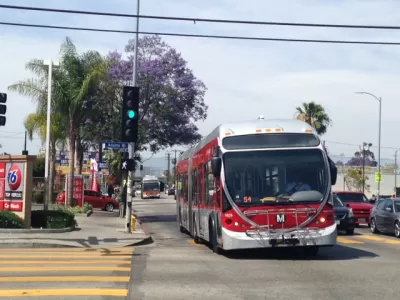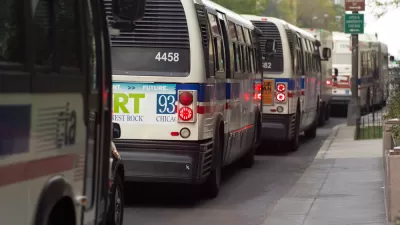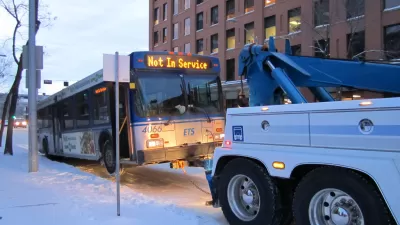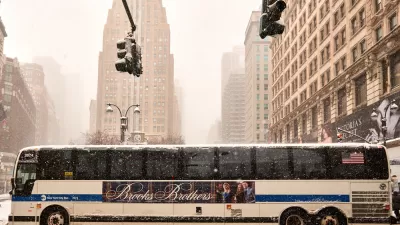The news about the decline of bus ridership around the country is making the rounds again. The future of bus transit as we know it seems to be in question.

David Harrison was the first to raise the alarms about declining bus ridership in August, with an article headlined by concern for the threat of declining ridership to the future of transit systems. "A staple of American urban life—the city bus—is in a state of steady decline," writes Harrison in the lede for the Wall Street Journal, which might be behind a paywall for some readers.
Leah Binkovitz followed that article with coverage for The Urban Edge that will be more accessible that the Wall Street Journal, tying the narrative back to the experience in Houston, which has proven to be an outlier after a bus system redesign in 2015.
Jeff Spross also followed up on the Wall Street Journal article. Here's Spross's take on the situation with bus transit, summarized:
You might be inclined to ask, so what? There are still subways, and people have cars. But the struggles of city buses are actually a microcosm for the full sweep of America's economic dysfunction. And like many parts of the economy, it never truly recovered from the Great Recession.
Another article from this month provides a local case study for the decline in bus ridership. Yonah Freemark wrote for Streetsblog USA of Los Angeles' declining bus ridership in a time of massive expansion of the regional rail system. That decline is placed in context of a popular narrative about Los Angeles achieving some kind of public transit enlightenment. The truth, according to Freemark, "is a little less dramatic," because "L.A.’s transit service was never that bad, while its purported transit renaissance has yet to translate into more people opting for buses and trains." The article includes an in-depth critique of the Los Angeles County Metropolitan Transportation Authority (Metro) transit system.
Planetizen's ongoing coverage of bus ridership last saw a crest in early 2017, when bus ridership data showed declines in Los Angeles and Tampa Bay, and transit ridership declined (rail included) in Washington, D.C. and Denver.
FULL STORY: America’s Buses Lose Riders, Imperiling Their Future

Maui's Vacation Rental Debate Turns Ugly
Verbal attacks, misinformation campaigns and fistfights plague a high-stakes debate to convert thousands of vacation rentals into long-term housing.

Planetizen Federal Action Tracker
A weekly monitor of how Trump’s orders and actions are impacting planners and planning in America.

In Urban Planning, AI Prompting Could be the New Design Thinking
Creativity has long been key to great urban design. What if we see AI as our new creative partner?

Massachusetts Budget Helps Close MBTA Budget Gap
The budget signed by Gov. Maura Healey includes $470 million in MBTA funding for the next fiscal year.

Milwaukee Launches Vision Zero Plan
Seven years after the city signed its Complete Streets Policy, the city is doubling down on its efforts to eliminate traffic deaths.

Portland Raises Parking Fees to Pay for Street Maintenance
The city is struggling to bridge a massive budget gap at the Bureau of Transportation, which largely depleted its reserves during the Civd-19 pandemic.
Urban Design for Planners 1: Software Tools
This six-course series explores essential urban design concepts using open source software and equips planners with the tools they need to participate fully in the urban design process.
Planning for Universal Design
Learn the tools for implementing Universal Design in planning regulations.
Gallatin County Department of Planning & Community Development
Heyer Gruel & Associates PA
JM Goldson LLC
City of Camden Redevelopment Agency
City of Astoria
Transportation Research & Education Center (TREC) at Portland State University
Jefferson Parish Government
Camden Redevelopment Agency
City of Claremont





























